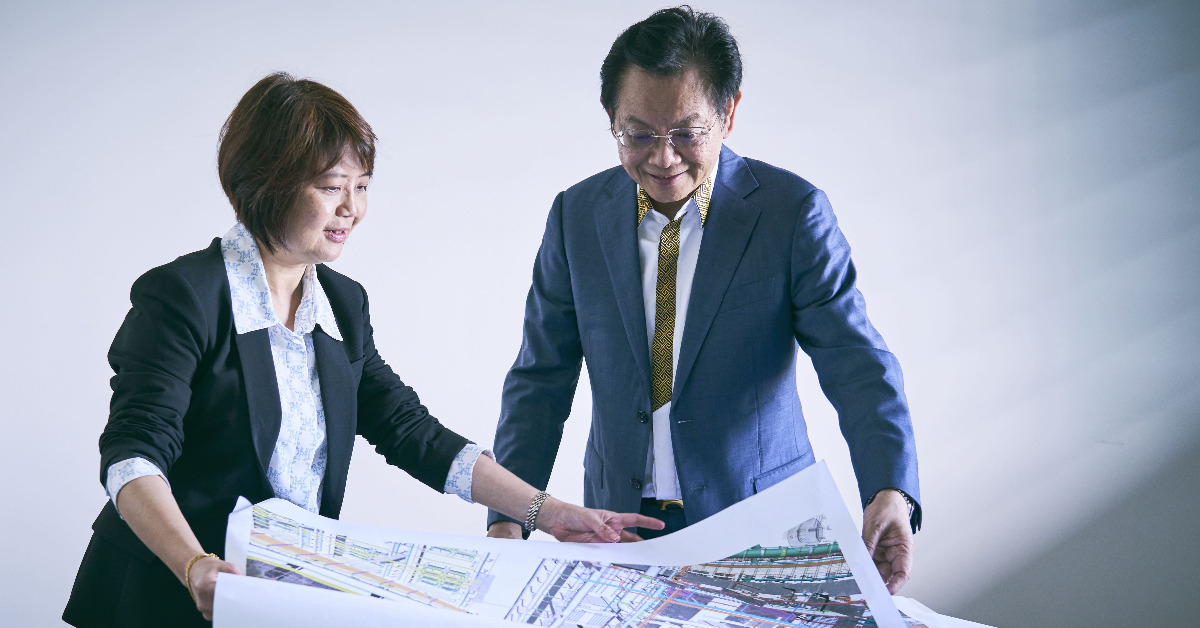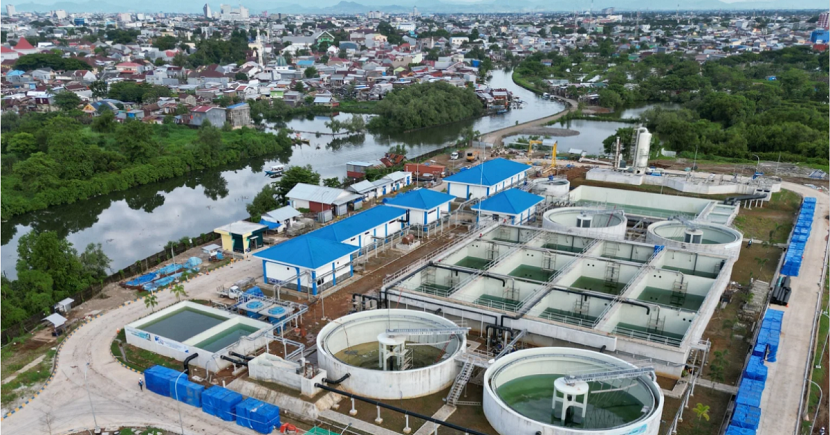Business Transformation: Husband-and-wife team transforms their small firm into a $132m regional powerhouse
First published in The Straits Times on 30 March 2023.

Theirs is a story of a marriage made in heaven evolving into a partnership that prospered from a passion for growth and transformation.
When husband-and-wife team Tay Kiat Seng and Dewi Kwek founded water and wastewater treatment firm Memiontec with their savings in 1992, they swapped stable jobs in well-established companies in the industry for a small office in Balestier.
In the early years, they shared just one table, fax machine and telephone. He is Memiontec’s executive director and chief executive, and she is its managing director.
“We wanted to be entrepreneurs and liked the challenge of creating something of our own,” says Mr Tay, 60, who met Ms Kwek, 56, in 1988. They were working at the same company in Australia then.
Their leap of faith paid off. Over 30 years, the couple, who have two children together, built Memiontec into a regional powerhouse with about 240 employees and subsidiaries in Indonesia and China.
The company, which listed on the Singapore Exchange’s Catalist board in 2020, is worth $132 million. Last year it clinched its largest contract, worth $56.6 million, to install equipment for the Changi Water Reclamation Plant, and started its third expansion overseas, to Vietnam.
Along the way, it has diversified its business to add revenue streams, used different strategies to succeed in each market, and continued to learn from others to enhance its plans for the future.
Ms Kwek shares: “You have to be open to change and embrace transformation if you want to grow. We want to hit $500 million in market capitalisation by 2026 and expand Memiontec into a multinational corporation that flies the Singapore flag everywhere.”
Expanding into new markets
The company spent its initial years winning local contracts to develop a track record, as well as earning licences to bid for larger projects in the public sector.
After six years, it started to look abroad. “Singapore is very small, and the opportunities are greater in bigger countries,” says Ms Kwek.
Indonesia was a natural target, with its rapidly growing population and industries that need clean water. The country has over 270 million people (47 times the size of Singapore’s population) – a figure that could grow to more than 290 million by 2030, according to World Bank estimates.
It is also where Ms Kwek, who is now a Singapore permanent resident, grew up. Armed with her knowledge of Indonesia’s business landscape, the firm focused on multinational companies operating in Indonesia, especially those in the pharmaceutical sector.
“Foreign businesses value Singapore’s reputation in water treatment, and the pharmaceutical sector needs not just clean but ultra-pure water. This is our forte. We had fewer competitors in Indonesia in this.”
- 36.4%
Memiontec’s increase in profit ($8.6 million) in the last financial year with the help of overseas contracts - Up to 50 years
Memiontec could generate 25 to 50 years of recurring income with Build-Own-Operate-Transfer and Transfer-Own-Operate-Transfer projects - $500m
Memiontec’s market capitalisation goal for 2026, up from $132 million currently
Memiontec incorporated subsidiaries in Indonesia in 2004 and continued to increase its list of customers there. Today, clients in Indonesia make up 60.7 per cent of the company’s revenue.
In 2009, an opportunity came calling in China. Memiontec received an order from an electronics firm to build a water and wastewater treatment plant in Wuxi.
Mr Tay recalls: “We built the plant and handled its maintenance, so we had a foothold there. Later, when we saw that many electronics and semiconductor firms were moving to China to lower their costs, we quickly formed a subsidiary in Chengdu in 2015 to tap on this market."
Diversifying revenue streams
Even as Memiontec grew its business in Singapore, China and Indonesia, it searched for ways to expand. Since its founding, it had specialised in engineering, procurement and construction (EPC) projects – essentially, designing and building systems and plants, and then handing them over to the customer.
In 2016, it moved into Build-Own-Operate-Transfer (BOOT) and Transfer-Own-Operate-Transfer (TOOT) projects, taking on the additional roles of financing, operating and maintaining plants and selling their treated water. With Enterprise Singapore’s (EnterpriseSG) support, it partnered firms in Indonesia to get such projects off the ground.

“With EPC projects, you finish them and get paid, and that’s it. With BOOT and TOOT projects, you get more and recurring income streams from the extra work. The concession periods to manage the plants and sell the water can be up to 25 or even 50 years. It’s a much more stable revenue (stream) for the company,” Mr Tay says.
“With all the experience that we accumulated through our EPC projects, we knew we could do a good job.”
After successfully listing in Singapore, it joined EnterpriseSG’s Scale-Up programme in 2021. The 12- to 18-month programme helps high-potential local firms accelerate their growth and expand globally.
Executives from the firms work with local and international consultancies to create and fine-tune growth strategies, and network with other local business leaders.
“You get advice from experts who have your best interests at heart. We were very excited about that. We want to make use of every chance we can get to open up our lead over our competitors.”
With the consultants’ input, Memiontec has crafted a growth plan with five pillars for the next few years. These include securing more BOOT and TOOT projects and partnerships with firms in Indonesia to upgrade from industrial and commercial projects to bigger, municipal projects.
One of its growth pillars is also to venture into more markets, such as Vietnam.
Mr Tay notes that Vietnam has about 300 operational industrial zones. Each contains many different sectors that require water and wastewater treatment services. This makes it a top priority for the company, which was why it set up a subsidiary in the country last October.
EnterpriseSG’s overseas centre in Vietnam is also helping by connecting Memiontec with local water treatment firms. The company plans to enter into joint ventures with some businesses and acquire others to expand its presence quickly and get ahead of potential rivals in the country.
“We’re being more aggressive now than we were in China and Indonesia, but that’s because we’re a larger company now with more resources. You adopt different strategies when you’re at a different growth stage,” says Ms Kwek.
Both Mr Tay and Ms Kwek are confident that Memiontec is on track to achieve its $500 million goal in the next three years, given that it became more profitable last year. He says with a laugh: “After that, it might be time to start thinking about $1 billion."
Maximising talent for growth
For businesses to succeed, recruiting and retaining the right talent is crucial, says Memiontec executive director and chief executive Tay Kiat Seng.
After attending Enterprise Singapore’s Scale-Up Programme and getting insights from local and international consultancies, Mr Tay has introduced detailed key performance indicators to identify high-achieving staff, such as tracking sales employees’ numbers of quotations and purchase orders.
“We have a much better system now, and we can also tell which department is more capable and cohesive,” he adds.
He notes that companies must have clear strategies to improve their operations and fuel their growth. “If you want to go overseas, you must learn the culture, find local partners and build local teams. Get help if you need it. With our expansion to Vietnam, EnterpriseSG’s contacts have been invaluable.”
“You can reach out to other Singaporean businesses that have made the journey and learn from them too. There’s no need to do it alone.”
This is the second of a three-part series on how local firms can strengthen their capabilities to transform and thrive. Click here to find out more about how Enterprise Singapore can help.

